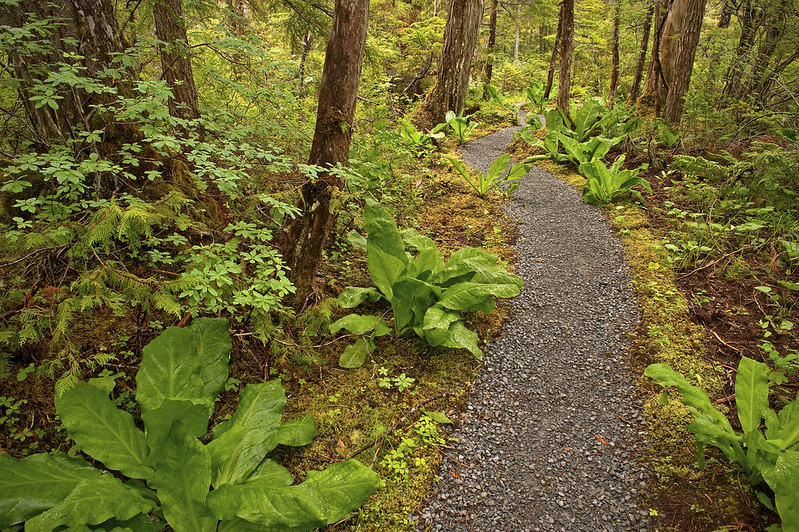If President Donald Trump’s administration has its way, Southeast Alaska’s vast Tongass National Forest’s Roadless Rule protections will be removed, leaving the Tongass and other national forests vulnerable to large-scale mining and other projects that conservationists have been fighting to prevent.
First up, here’s the USDA/Forest Service press release:
Secretary Rollins Rescinds Roadless Rule, Eliminating Impediment to Responsible Forest Management
(Santa Fe, N.M., June 23, 2025) – Today, U.S. Secretary of Agriculture Brooke L. Rollins announced during a meeting of the Western Governors’ Association in New Mexico, the U.S. Department of Agriculture (USDA) is rescinding the 2001 Roadless Rule. This outdated administrative rule contradicts the will of Congress and goes against the mandate of the USDA Forest Service to sustain the health, diversity, and productivity of the nation’s forests and grasslands. Rescinding this rule will remove prohibitions on road construction, reconstruction, and timber harvest on nearly 59 million acres of the National Forest System, allowing for fire prevention and responsible timber production.
This rule is overly restrictive and poses real harm to millions of acres of our national forests. In total, 30% of National Forest System lands are impacted by this rule. For example, nearly 60% of forest service land in Utah is restricted from road development and is unable to be properly managed for fire risk. In Montana, it is 58%, and in Alaska’s Tongass National Forest, the largest in the country, 92% is impacted. This also hurts jobs and economic development across rural America. Utah alone estimates the roadless rule alone creates a 25% decrease in economic development in the forestry sector.
“Once again, President Trump is removing absurd obstacles to common sense management of our natural resources by rescinding the overly restrictive roadless rule,” said Secretary Brooke Rollins. “This move opens a new era of consistency and sustainability for our nation’s forests. It is abundantly clear that properly managing our forests preserves them from devastating fires and allows future generations of Americans to enjoy and reap the benefits of this great land.”
This action aligns with President Trump’s Executive Order 14192, Unleashing Prosperity Through Deregulation to get rid of overcomplicated, burdensome barriers that hamper American business and innovation. It will also allow more decisions to be made at the local level, helping land managers make the best decisions to protect people, communities and resources based on their unique local conditions.
Of the 58.5 million acres of inventoried roadless areas covered under the 2001 Roadless Rule, 28 million acres are in areas at high or very high risk of wildfire. Rescinding this rule will allow this land to be managed at the local forest level, with more flexibility to take swift action to reduce wildfire risk and help protect surrounding communities and infrastructure.
The Sierra Club was one of the first organizations to react to this latest twist in the saga:
In response, Alex Craven, Sierra Club’s forest campaign manager, released the following statement:
“Once again, the Trump administration is ignoring the voices of millions of Americans to pursue a corporate giveaway for his billionaire buddies. Stripping our national forests of roadless rule protections will put close to 60 million acres of wildlands across the country on the chopping block. That means polluting our clean air and drinking water sources to pad the bottom lines of timber and mining companies – all while pursuing the same kind of mismanagement that increases wildfire severity.
“Two decades ago, millions of Americans demanded protections for our wild landscapes and forests – and our leaders listened. Right now, when millions of Americans are demanding the preservation of the national forests we treasure, it’s critical our leaders listen and not sell them out to billionaires and private industry.”
We’ll update as we hear more on this latest news.
And here’s more reaction, starting with Alaska Environment:
STATEMENT: Secretary Rollins proposes rescinding protections for roadless forests
The Roadless Rule protects 58.5 million acres of national forests, including many in Alaska, from new roads and commercial logging
ANCHORAGE, Alaska– On Monday, the U.S Department of Agriculture Secretary Brooke L. Rollins announced a plan to roll back the 2001 Roadless Rule at a Western Governor’s Association Meeting. In January 2001, after robust public input, federal protections designating nearly 60 million acres of our national forests as roadless areas went into effect, including protections for 9 million acres in the Tongass National Forest. By being designated “roadless” these portions of national forest became off limits for road building and commercial logging, allowing habitats, watersheds, and wildlife to thrive. The rollback of the rule would remove those limits.
The process for the rollback and whether there will be opportunity for public comment has not been announced yet.
In response, Alaska Environment Research & Policy Center’s State Director Dyani Chapman issued the following statement:
“Slicing up the Tongass through road building will compromise the forest, put fish and other wildlife at risk, and allow the logging of trees older than the United States. Roadless national forests are an incredible place to hunt, fish, hike, and for wildlife to live at least in part because it takes effort to get deep into them,” said Dyani Chapman, Alaska Environment Research & Policy Center State Director. “There are forests that shouldn’t be logged and places where roads shouldn’t be built. The Roadless Rule is a successful conservation tool, and it should stay in place.”
